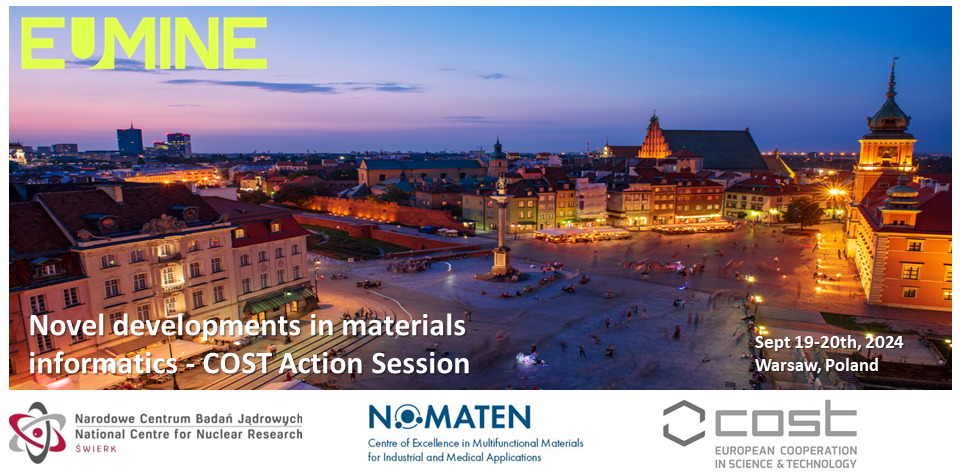Welcome to the Novel developments in materials informatics - COST Action Session (September 19th)
Materials informatics is revolutionizing the field of materials science by leveraging data-driven approaches and advanced computational techniques to accelerate the discovery, development, and optimization of materials. By integrating vast amounts of experimental and computational data with machine learning and artificial intelligence, materials informatics enables researchers to predict material properties, identify novel materials, and optimize manufacturing processes with unprecedented speed and accuracy. This interdisciplinary approach not only enhances our fundamental understanding of materials but also drives innovation across various industries, from electronics and aerospace to healthcare and sustainable energy solutions. As we continue to face global challenges, materials informatics stands at the forefront, offering powerful tools to develop the next generation of advanced materials and technologies.
The symposium, co-organized with the EU COST action CA24143 EuMINe - European Materials Informatics Network (https://www.cost.eu/actions/CA22143/) aims to bring together leading researchers, industry professionals, and policymakers to explore cutting-edge advancements in the field of materials informatics, with a particular focus on the applications of advanced materials and manufacturing technologies.
The EuMINe COST Action (European Network for Materials Informatics) is a multidisciplinary initiative that seeks to harness the potential of materials informatics to accelerate research and innovation across Europe. By creating a collaborative platform that bridges science, industry, and management, EuMINe aims to foster the development and integration of new computational tools, data-driven approaches, and machine learning techniques in materials science. Our goal is to enhance the understanding, design, and application of advanced materials, ultimately contributing to technological advancements and economic growth.
Scope of the Symposium
Topics:
The "Novel Developments in Materials Informatics" symposium will cover a wide range of topics related to the latest research and innovations in materials informatics. Key areas of focus will include, but are not limited to:
- Data-driven materials discovery: exploring the use of big data, machine learning, and artificial intelligence to accelerate the discovery and development of new materials.
- Integration of experimental and computational data: approaches for combining experimental data with computational simulations to enhance material insights.
- High-Throughput experimentation and modelling and data generation: innovations in automating experiments to rapidly generate high-quality data for informatics applications.
- Lab automation for research on materials: exploring the role of automation in enhancing the efficiency and precision of laboratory research and manufacturing processes.
- Machine learning algorithms for materials science: development and application of machine learning models tailored for materials research.
- Big-data analytics and management: approaches for handling, analyzing, and extracting valuable insights from large datasets in materials science.
- Computational materials science: advancements in computational methods and simulations that enhance the understanding of material properties and behaviors.
- Advanced materials manufacturing: integration of materials informatics with advanced manufacturing processes such as additive manufacturing, nanofabrication, and smart manufacturing systems.
- Applications in industry: real-world applications of materials informatics in various industries, including electronics, aerospace, automotive, healthcare, and energy.
- Sustainability and circular economy: innovative approaches to using materials informatics for developing sustainable materials and processes, and promoting a circular economy.
The symposium will feature keynote lectures, oral presentations, and poster sessions, providing a comprehensive platform for knowledge exchange and networking. Attendees will have the opportunity to engage with experts in the field, share their latest research findings, and discuss future directions and collaborations.
Organizers:
Javier Dominguez
National Centre for Nuclear Research
Andrzeja Soltana 7
05-400, Otwock, Poland
javier.dominguez@ncbj.gov.pl
Francesco Mercuri
Consiglio Nazionale delle Ricerche
CNR-ISMN, Via P. Gobetti, 101
40129 Bologna, Italy
francesco.mercuri@cnr.it

